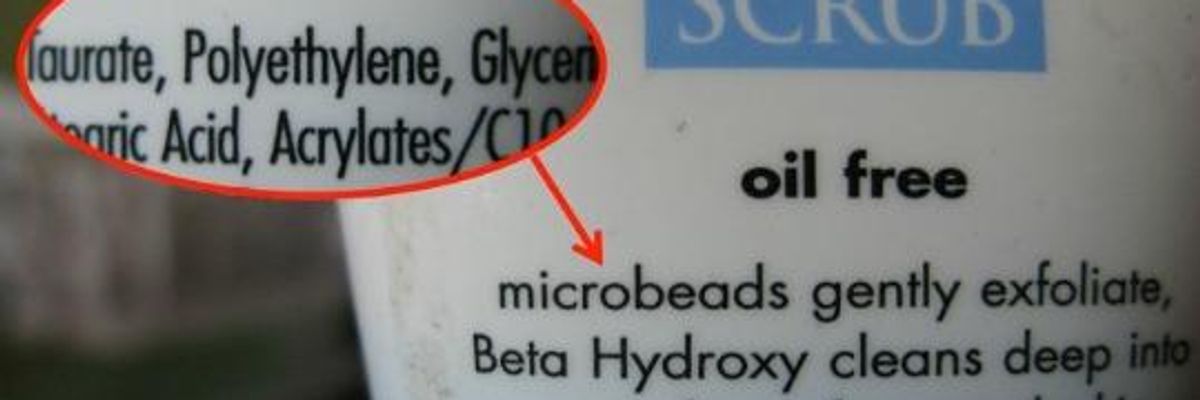
(Image: 5 Gyres)
To donate by check, phone, or other method, see our More Ways to Give page.

(Image: 5 Gyres)
They are the tiny beads and pieces of plastic found in facial scrubs and other cleansing projects. And now they are washing down the drain and spreading from sewage systems into oceans, gulfs, lakes, and rivers around the world, where they are adding to plastic pollution that threatens those ecosystems and wildlife.
Illinois is one of several states considering a legislative defense against these polluting microbeads--which have already been found in Illinois waterways, including millions in Lake Michigan.
Illinois lawmakers are weighing a bill that would phase out the sale of such microbeads for personal care purposes by the end of 2018 and prohibit the manufacture of the products by the end of 2017.
According to The Chicago Tribune, the bill, which was introduced by State Sen. Heather Steans (D-Chicago) last month, is in good shape for passage. It was approved in the State Senate last week with no opposition and is next headed to the House.
However, green groups charge that the legislation is not aggressive enough.
"Illinois is putting the environment at a much greater a risk because it has a very non-aggressive timeline for phase-out," said Stiv Wilson, associate director of environmental group 5 Gyres Institute, in an interview with The Chicago Tribune.
Micro-plastics, which do not biodegrade, attract environmental pollutants like "DDT, PCBs, flame-retardants, and other industrial chemicals," according to 5 Gyres.
They are designed to wash down the drain, and many sewage treatment facilities do not capture them.
According to 5 Gyres, a single facial cleanser can contain over 300,000 of these microbeads.
_____________________
Trump and Musk are on an unconstitutional rampage, aiming for virtually every corner of the federal government. These two right-wing billionaires are targeting nurses, scientists, teachers, daycare providers, judges, veterans, air traffic controllers, and nuclear safety inspectors. No one is safe. The food stamps program, Social Security, Medicare, and Medicaid are next. It’s an unprecedented disaster and a five-alarm fire, but there will be a reckoning. The people did not vote for this. The American people do not want this dystopian hellscape that hides behind claims of “efficiency.” Still, in reality, it is all a giveaway to corporate interests and the libertarian dreams of far-right oligarchs like Musk. Common Dreams is playing a vital role by reporting day and night on this orgy of corruption and greed, as well as what everyday people can do to organize and fight back. As a people-powered nonprofit news outlet, we cover issues the corporate media never will, but we can only continue with our readers’ support. |
They are the tiny beads and pieces of plastic found in facial scrubs and other cleansing projects. And now they are washing down the drain and spreading from sewage systems into oceans, gulfs, lakes, and rivers around the world, where they are adding to plastic pollution that threatens those ecosystems and wildlife.
Illinois is one of several states considering a legislative defense against these polluting microbeads--which have already been found in Illinois waterways, including millions in Lake Michigan.
Illinois lawmakers are weighing a bill that would phase out the sale of such microbeads for personal care purposes by the end of 2018 and prohibit the manufacture of the products by the end of 2017.
According to The Chicago Tribune, the bill, which was introduced by State Sen. Heather Steans (D-Chicago) last month, is in good shape for passage. It was approved in the State Senate last week with no opposition and is next headed to the House.
However, green groups charge that the legislation is not aggressive enough.
"Illinois is putting the environment at a much greater a risk because it has a very non-aggressive timeline for phase-out," said Stiv Wilson, associate director of environmental group 5 Gyres Institute, in an interview with The Chicago Tribune.
Micro-plastics, which do not biodegrade, attract environmental pollutants like "DDT, PCBs, flame-retardants, and other industrial chemicals," according to 5 Gyres.
They are designed to wash down the drain, and many sewage treatment facilities do not capture them.
According to 5 Gyres, a single facial cleanser can contain over 300,000 of these microbeads.
_____________________
They are the tiny beads and pieces of plastic found in facial scrubs and other cleansing projects. And now they are washing down the drain and spreading from sewage systems into oceans, gulfs, lakes, and rivers around the world, where they are adding to plastic pollution that threatens those ecosystems and wildlife.
Illinois is one of several states considering a legislative defense against these polluting microbeads--which have already been found in Illinois waterways, including millions in Lake Michigan.
Illinois lawmakers are weighing a bill that would phase out the sale of such microbeads for personal care purposes by the end of 2018 and prohibit the manufacture of the products by the end of 2017.
According to The Chicago Tribune, the bill, which was introduced by State Sen. Heather Steans (D-Chicago) last month, is in good shape for passage. It was approved in the State Senate last week with no opposition and is next headed to the House.
However, green groups charge that the legislation is not aggressive enough.
"Illinois is putting the environment at a much greater a risk because it has a very non-aggressive timeline for phase-out," said Stiv Wilson, associate director of environmental group 5 Gyres Institute, in an interview with The Chicago Tribune.
Micro-plastics, which do not biodegrade, attract environmental pollutants like "DDT, PCBs, flame-retardants, and other industrial chemicals," according to 5 Gyres.
They are designed to wash down the drain, and many sewage treatment facilities do not capture them.
According to 5 Gyres, a single facial cleanser can contain over 300,000 of these microbeads.
_____________________